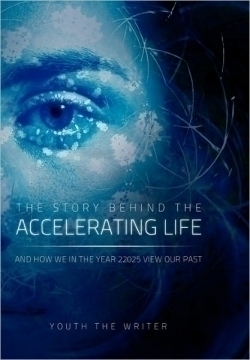The Story Behind the Accelerating Life
“How can you prove whether at this moment we are sleeping, and all our thoughts are a dream; or whether we are awake, and talking to one another in the waking state?”
-Plato
Philosophers from Plato and Augustine to Heidegger and Wittgenstein have used a dialogue format as a means to explain their ideas. Youth the Writer chose to implement a dialogue format to explain the meaning of life and why human beings face so many hardships. According to Youth, we who exist currently in 2010-2011 are actually living an “Accelerated Life;” in reality, we are living in the year 22025. This revelation was shown to him though a series of dreams that consist of dialogues between two characters in 22025: Ace and the Professor. Youth includes himself in the dialogues only as an observer. He is unable to communicate directly with Ace and the Professor, but does provide commentary on their conversations. To comprehend, let alone understand the concepts the author wishes to share, he insists that readers must open their minds and use their imaginations. He writes, “Imagination is a key for understanding difficult, unknown subjects. It’s an important tool. We must all use it to full extent.”
The author’s dialogues have not been edited properly and are riddled with grammatical errors and awkward sentences. In certain dialogues, especially a dramatic piece, leeway is given in the usage of grammar to lend a realistic flavor to the conversation between characters. A philosophical treatise presented in a dialogue, however, must be written with proper language mechanics to make sure the author’s ideas are stated clearly. The use of correct grammar and syntax lends to its power and impact. Poorly written prose and haphazard grammar lead to ambiguity and misinterpretation. To allow the Professor, the wisest and most intelligent character in Youth’s dialogue, to speak with poor grammar will cause readers to wonder about the validity of his statements and the actual sum of his intellect. The Professor is supposed to be almost omnipotent.
The author illustrates this when Ace asks, “Who or what are you, Professor?” The Professor replies, “I am the accumulation of billions of the brightest minds that lived before and many are still living.” He continues, “…the advances in science helped us to understand the human mind and what we can achieve with it. With creative imagination, we started to experiment until we found the way to upload and download properties of the brain. With time and supercomputers, we started to be immortal, which have led us to accumulate the brightest minds.” An advanced artificial intelligence, an “accumulation of billions of the brightest minds that ever lived,” would not speak so awkwardly.
The author has rehashed and tried to revamp a few age-old maxims including, 1) we must love and treat each other with respect, and 2) we must read and learn from the books of the masters. A marriage of science fiction and philosophical dialogue is a clever concept but Youth’s conceptions are blemished by improper grammar and awkward sentences that make it is hard to take his discourse seriously.
Reviewed by
Lee Gooden
Disclosure: This article is not an endorsement, but a review. The publisher of this book provided free copies of the book and paid a small fee to have their book reviewed by a professional reviewer. Foreword Reviews and Clarion Reviews make no guarantee that the publisher will receive a positive review. Foreword Magazine, Inc. is disclosing this in accordance with the Federal Trade Commission’s 16 CFR, Part 255.

